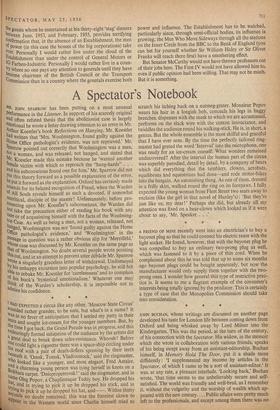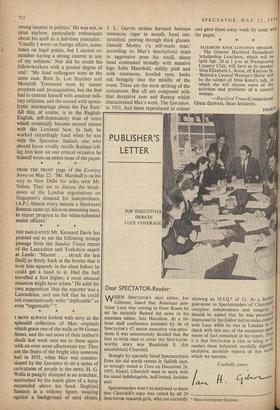JOHN BUCHAN, whose writings are discussed on another page developed
his taste for London life between coming down from Oxford and being whisked away by Lord Milner into the Kindergarten. This was the period, at the turn of the century, of his connection with the Spectator. His widow, in the memoir which she wrote in collaboration with various friends, speaks of his being swept away from an assistant-editorship. Buchan himself, in Memory Hold The Door, put it a shade more diffidently : 'I supplemented my income , by articles in the Spectator, of which I came to be a sort of assistant-editor.' It was, at any rate, a pleasant interlude. `Looking back,' Buchan wrote, `that time seems to me unbelievably secure and self- satisfied. The world was friendly and well-bred, as I remember it, without the vulgarity and the worship of wealth which ap- peared with the new century.... Public affairs were pretty much left to the professionals, and except among them there was no strong interest in politics.' He was not, in print anyhow, particularly enthusiastic about his spell as a full-time journalist : 'Usually I wrote on foreign affairs, some- times on legal points, but I cannot re- member having a strong interest in any of my subjects.' Nor did he credit his fellow-workers with a greater degree of zeal : 'My kind colleagues were in the same case. Both St. Loe Strachey and Meredith Townsend were by nature prophets and propagandists, but the first had to content himself with amateur mili- tary criticism, and the second with apoca- lyptic murmurings about the Far East.' All this, of course, is in the English- English, self-deprecatory tone of voice which eventually became second nature with this Lowland Scot. In fact, he worked exceedingly hard when he was with the Spectator. Indeed, one who should know vividly recalls Buchan tell- ing him how on one critical occasion he himself wrote an entire issue of the paper.











































 Previous page
Previous page